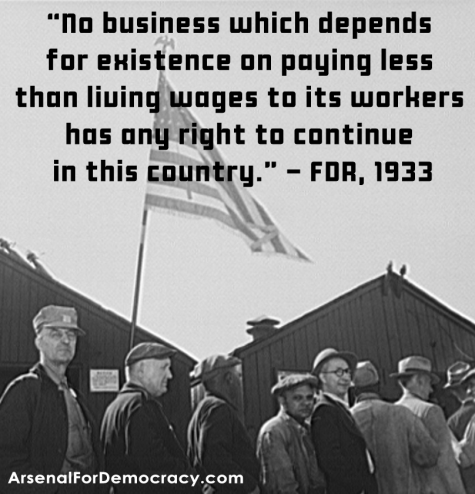The stabbing attack at the University of Arkansas serves as a reminder of how insane the “if we outlaw guns, people will kill each other in other ways” argument is. If you don’t know what you’re doing, it’s really, really hard to kill someone without a weapon designed for that purpose: obviously, a machete attack is a horrible event, but it resulted in… three people injured, counting the perpetrator.
Sept 9, 2015 – Arsenal For Democracy 142
Posted by Bill on behalf of the team.

Topics: Are Blairites and Clintonites right about the center-left? What lessons can be learned from the 1820s and 1830s in US politics? Understanding the Trump bankruptcies better. People: Bill, Nate. Produced: September 6th, 2015.
Episode 142 (51 min):
AFD 142
Discussion Points:
– Corbyn and Sanders: Are centrist Blairites and Clintonites right about the left?
– US history: What lessons can be learned from the 1820s and 1830s in US politics?
– Trump bankruptcies: Not as negative as widely suggested? We compare and contrast.
Related Links
– AFD: “The Only Way is Blair”
– AFD: “When The Party’s Over: The 1820s in US Politics”
– AFD: “Op-Ed | Trump’s Bankruptcies in Perspective”
Subscribe
RSS Feed: Arsenal for Democracy Feedburner
iTunes Store Link: “Arsenal for Democracy by Bill Humphrey”
And don’t forget to check out The Digitized Ramblings of an 8-Bit Animal, the video game blog of our announcer, Justin.
Podcast: Play in new window | Download
Subscribe: RSS
Op-Ed | The Future of Living Wages
This essay was originally published in The Globalist.

What can governments do for incomes in an era of intense global labor competition and automation?
Whose duty is it to ensure a living wage in a global economy where jobs can be moved easily to more “flexible” jurisdictions? And how is that goal of a living wage best achieved, regardless of any moral responsibility?
Increasingly, those questions may have two very different answers, as abstract ideals diverge from realistic solutions in the 21st century.
Aging policies
One common policy solution of the 20th century industrialized world was legal compensation floors, mainly hourly minimum wage laws. Companies were simply compelled to meet their duty to workers.
The first country to authorize a government role in setting minimum wages was New Zealand in 1894. The United States saw its first state minimum authorized in 1912, just over a century ago.
Franklin D. Roosevelt, the U.S.’s 32nd President and the leader of America’s New Deal, in 1933 explained the principle behind such mandates:
It seems to me to be equally plain that no business which depends for existence on paying less than living wages to its workers has any right to continue in this country.
In 1933, that statement was not just a moral argument, but also an enforceable policy position. Today, in many cases, it is not.
No enforceability
Large multinational corporations that operate worldwide have more leverage and flexibility in the global marketplace than any single national government. Their transnational character allows them to avoid national efforts to compel them to do their fair share under a more democratic capitalism.
In many sectors, if a large business has – in the words of Roosevelt – no “right to continue [operating] in this country” due to its preference for paying sub-living wages, it can and will simply go elsewhere.
The century-old mechanism of a legal wage minimum — while still critical — is losing its effectiveness against poverty and labor abuses due to the radical transformation of the global economy. New mechanisms are now urgently required to supplement it.
The underlying goal – the need for a living wage – that once led to the creation of minimum wages have not changed – but the toolbox must expand.
Until lately, the issue has stalled. In most of the industrialized world, strong social safety nets often reduced the perceived need for higher wages. Meanwhile, U.S. activists were tarred as closet socialists seeking the Europeanification of free-market America.
Everywhere, the poor typically lack political leverage. Their demands are frequently written off as ignorant populism detached from economic realities.
Tipping point
But we have reached a tipping point. Even techno-optimists – those who have long boosted the life-easing benefits of the arrival of robots – are now concerned.
They are starting to acknowledge that the pressure on wage levels (and employment levels themselves) will no longer just come from cheap, surplus human labor overseas. It will also come from increased mechanization, automation and robotics.
And this time, the pressure will affect (and is already starting to affect) workers with higher incomes, too. Read more
AFD Micron #26
The people using the recent failure to replicate many psychological studies as evidence that “science is broken” are the people who keep it that way. The whole point of the Reproducibility Project is that science is too focused on snappy results and jumping to conclusions, and too afraid of failure to reproduce findings to progress. If we view the natural process of science correcting itself as evidence of terrible failure, we only cause further problems.
Labor Day 2015: America is actually pro-union, finds Gallup
58% of Americans approve of Labor unions. 61% would like to see them have at least as much, if not more, influence in the future. The U.S. media consistently denigrates organized labor and suggests everyone hates them and all problems are their fault. That should stop.
(Source: Gallup, August 2015 via Polling Report)
Recently on this topic from AFD:
– The origin story of minimum wage laws, part 1
– The origin story of minimum wage laws, part 2
– Fair wages are just another operational cost to meet
– Key win for workers in the subcontract/franchise economy
“Hard-liners”
Our media should be willing to call inflexible and extreme U.S. politicians “hard-liners” like they do for their political reporting in every developing country.
Clerking for the Great Justice in the Sky
If you believe God is a higher and more binding authority than the U.S. Supreme Court, why would you insist on holding a government job?








